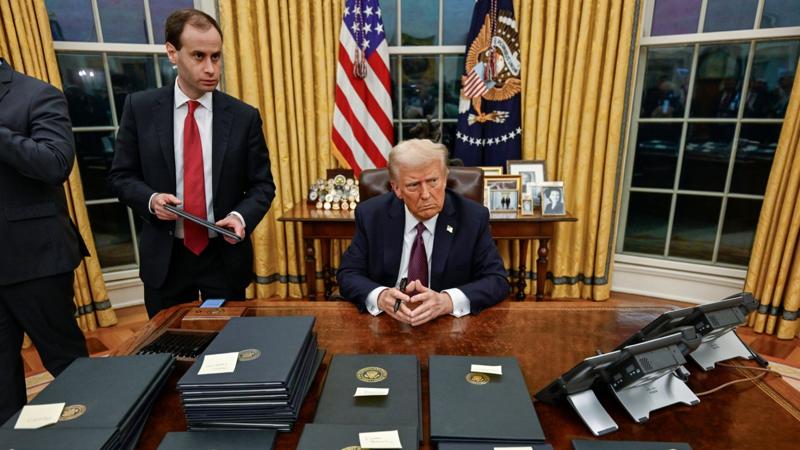President Donald Trump on Thursday said again that he wants a balanced budget, pushing Congress to do something that it hasn’t done in two decades.
Trump previously said he wants a balanced budget, but his promise to extended the tax rates in the 2017 Tax Cuts and Jobs Act could make that a challenge for both the House and Senate. Extending the tax rates could cost about $4 trillion.
On Thursday, Trump said it was time to try to balance the federal budget.
“Balance budget now??? Let’s give it a shot. Lots of money coming in from tariffs. Do it!” Trump wrote in all caps in a post on Truth Social.
Just how much money Trump’s tariffs will generate remains to be seen. Previous budget projections from outside groups have suggested tariffs won’t raise enough to offset Trump’s spending plans.
The House has proposed a $4.5 trillion, all-in-one bill that extends the tax cuts brokered during Trump’s first term in office. The Senate has proposed a fully offset $342 billion Senate bill that leaves the tax cuts for a later date. The House proposal would allow $2.8 trillion in deficit increases through 2034.
In the past 50 years, the federal government has ended with a fiscal year-end budget surplus four times, most recently in 2001. Congress has run a deficit every year since 2001.
Maya MacGuineas, president of the Committee for a Responsible Federal Budget, urged Congress to consider other options.
“The $2.8 trillion target is unquestionably too large and an astronomical figure given our massive debt burden,” she said. “We should not be borrowing another $2.80, let alone another $2.8 trillion. The House should revise the budget resolution to be deficit reducing or at the very least budget neutral.”
The Peter G. Peterson Foundation asked Congress to “do no fiscal harm.”
“There are plenty of options available for lawmakers to fully offset the cost of policies they wish to extend or enact, and they should avoid budget gimmicks or other fiscal shortcuts,” the group said. “As legislators consider policy initiatives to address this year, they should keep in mind the unsustainable fiscal situation that already exists and, at the very least, do no fiscal harm.”
Congress’s own research service, the Government Accountability Office, has for years warned presidents and lawmakers that the nation remains on an unsustainable fiscal path. The GAO repeated those warnings last week.
A GAO report warned that unchecked spending could push public debt to 219% of GDP by 2051 and create a significant economic and national security risk.
“We project that public debt will reach an unprecedented level by 2027,” said Gene Dodaro, U.S. Comptroller General and head of the GAO. “We’re calling on Congress and the Administration to act now to develop and implement a strategy to address this acute challenge. Inaction could result in great difficulties for many Americans and impede policymakers’ flexibility to respond to future economic recessions or unexpected events.”







